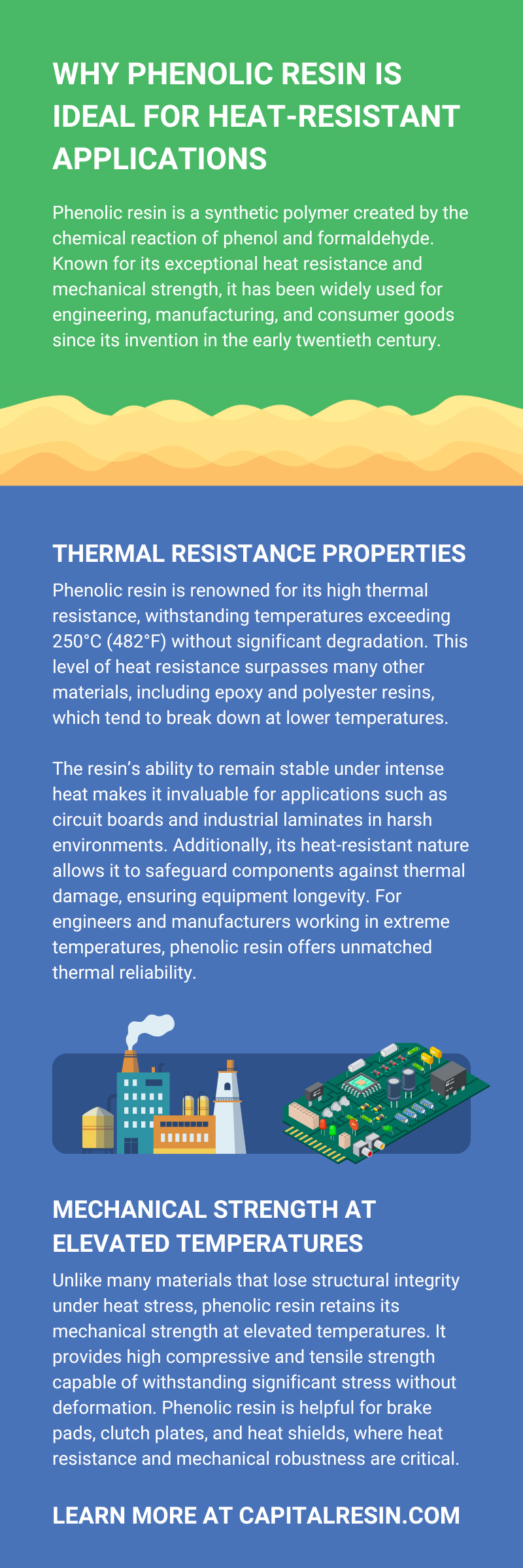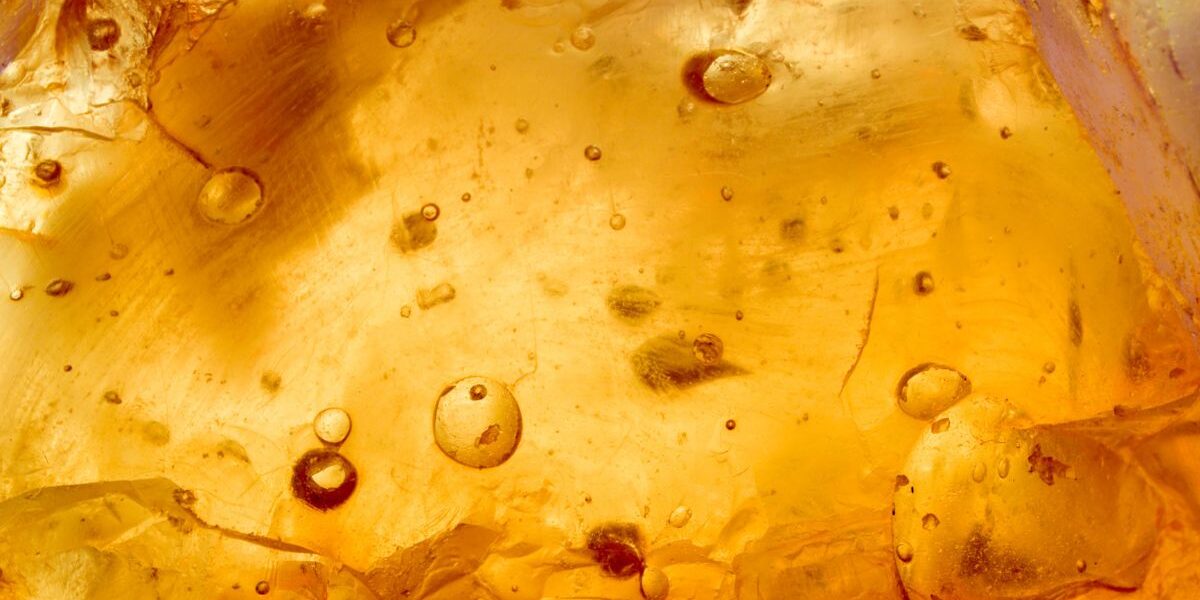Phenolic resin stands out among materials that can withstand extreme temperatures. With its exceptional thermal resistance, mechanical strength, and chemical stability, phenolic resin has become an indispensable material for the aerospace, automotive, and construction industries. Learn about its structure, properties, and use cases to see why phenolic resin is ideal for heat-resistant applications.
Introduction to Phenolic Resin
Phenolic resin is a synthetic polymer created by the chemical reaction of phenol and formaldehyde. Known for its exceptional heat resistance and mechanical strength, it has been widely used for engineering, manufacturing, and consumer goods since its invention in the early twentieth century.
Today, phenolic resin is a common choice for phenolic resin producers tackling heat-resistant projects. Over the years, its applications have expanded to include cutting-edge industries requiring materials with superior thermal properties.
Chemical Structure of Phenolic Resin
The chemical structure of phenolic resin is characterized by strong, cross-linked bonds formed during its polymerization process. These bonds primarily consist of aromatic rings of phenol molecules connected by methylene or dimethylene ether bridges. This dense and tightly packed molecular framework provides phenolic resin with remarkable thermal stability, as it retains its structural integrity even under high temperatures.
The rigidity of these bonds also contributes to the resin’s strength and resistance to deformation, making it ideal for applications requiring durability in extreme environments. Unlike other materials that weaken under prolonged heat exposure, phenolic resin maintains its robust chemical structure, ensuring long-term performance.
Thermal Resistance Properties
Phenolic resin is renowned for its high thermal resistance, withstanding temperatures exceeding 250°C (482°F) without significant degradation. This level of heat resistance surpasses many other materials, including epoxy and polyester resins, which tend to break down at lower temperatures.
The resin’s ability to remain stable under intense heat makes it invaluable for applications such as circuit boards and industrial laminates in harsh environments. Additionally, its heat-resistant nature allows it to safeguard components against thermal damage, ensuring equipment longevity. For engineers and manufacturers working in extreme temperatures, phenolic resin offers unmatched thermal reliability.
Mechanical Strength at Elevated Temperatures
Unlike many materials that lose structural integrity under heat stress, phenolic resin retains its mechanical strength at elevated temperatures. It provides high compressive and tensile strength capable of withstanding significant stress without deformation. Phenolic resin is helpful for brake pads, clutch plates, and heat shields, where heat resistance and mechanical robustness are critical.
Furthermore, its rigidity and durability ensure consistent performance, even in applications involving high-friction environments. This combination of heat tolerance and strength makes phenolic resin an invaluable material for demanding operational settings.
Low Thermal Conductivity
Phenolic resin’s low thermal conductivity makes it an excellent insulating material for applications requiring thermal efficiency. For example, phenolic resin is common in insulation panels and energy-efficient construction systems. By reducing heat loss, it contributes to improved energy conservation, especially in buildings and industrial processes.
The resin’s low thermal conductivity ensures energy efficiency and safety in certain applications by limiting temperature rise in heat-sensitive areas. Its dual role as an insulator and structural material makes it a highly versatile choice.
Flame Retardant Capabilities
Phenolic resin possesses inherent flame-retardant properties, making it a safer option for heat-exposed applications. When exposed to fire, it forms a protective char layer that acts as a barrier to oxygen, effectively slowing down combustion.
Additionally, phenolic resin self-extinguishes, stopping burning after the flame source is removed. These characteristics are critical for applications in the construction and transportation sectors, where fire resistance is paramount. Products such as fire-resistant doors, thermal shields, and aircraft interiors often utilize phenolic resin to meet strict safety standards while maintaining performance in high-heat environments.
Chemical and Thermal Stability
Phenolic resin showcases outstanding chemical and thermal stability, allowing it to withstand harsh conditions without significant degradation. Phenolic resin is ideal for heat resistance due to its chemical decomposition, making it suitable for industrial environments where exposure to acids, alkalis, or other corrosive substances is common. At the same time, its thermal stability ensures reliable performance, even under prolonged heat exposure.
This combination of properties enables the phenolic resin to excel in applications such as chemical processing equipment, laboratory surfaces, and thermal linings in hazardous environments. Whether it’s exposed to extreme heat or aggressive chemicals, phenolic resin maintains its integrity and functionality.
Dimensional Stability Under Heat
Dimensional stability is a defining feature of phenolic resin, as it retains its size and shape even under fluctuating temperatures. Its low coefficient of thermal expansion minimizes distortion, ensuring consistent performance in applications that demand precise tolerances.
This property is particularly valuable in the electronics industry, where circuit boards need to remain structurally stable during high-heat operations. Phenolic resin’s dimensional reliability makes it ideal for heat shields and engine components that must endure thermal cycling.
Applications in Heat-Resistant Contexts
Phenolic resin is widely popular in various heat-resistant applications across industries. In the aerospace industry, it is a go-to material for manufacturing thermal shields, engine components, and insulation panels. The automotive sector uses it extensively in brake pads, clutch plates, and engine parts requiring durability and heat resistance.
Meanwhile, the construction industry benefits from its application in fire-resistant doors, insulation materials, and composite panels. The remarkable properties of phenolic resin make it indispensable for countless heat-resistant applications.
Comparison to Other Resins
Compared to epoxy and polyester resins, phenolic resin offers superior heat resistance, flame retardance, and chemical stability. Epoxy resins, while strong and versatile, often degrade under prolonged heat exposure, making them less suitable for high-temperature environments. Polyester resins are more cost-effective but fall short in thermal resistance and flame retardance.
Phenolic resin’s ability to combine strength, durability, and heat tolerance gives it a significant edge in applications requiring long-term performance.
Advantages in Manufacturing Processes
Phenolic resin is versatile in application and offers significant advantages in manufacturing processes. Its ease of processing and curing allows for efficient production timelines, reducing manufacturing costs.
Additionally, it is compatible with a wide range of reinforcement materials, making it ideal for producing high-strength composites. This adaptability enables manufacturers to tailor phenolic resin products to specific performance needs while maintaining cost-effectiveness. The ability to process phenolic resin into various shapes and forms further expands its potential in diverse industries.
Challenges and Considerations
Despite its many advantages, phenolic resin does have limitations. For example, it can be brittle compared to other resins, making it less suitable for applications requiring significant flexibility.
The curing process can also involve higher temperatures, which may increase manufacturing complexity in certain cases. However, these challenges can be mitigated with proper formulation and design considerations.
Phenolic resin continues to prove its value as a robust and adaptable material in various industries. As advancements in technology and sustainability progress, the potential for phenolic resin to drive innovative solutions will only grow. This material promises to remain a vital component in pursuing safer and more efficient industrial developments.








